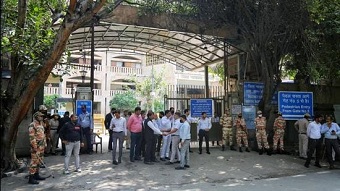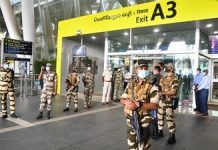Proposing a slew of measures for enhancing security in the district courts of the national capital, the Delhi high court has said special courtrooms may be created within jails to hold hearings related to high-risk prisoners, so that their physical appearance before the courts is reduced.
While hearing a suo motu petition, taken up after jailed gangster Jitendra Maan Gogi was shot dead inside the Rohini court in September, a bench of chief justice DN Patel and justice Jyoti Singh said the appearance of high-risk prisoners before the courts should be ensured, as far as possible, only through the virtual mode.
When and if they are required to be physically present, the court suggested that proceedings be conducted inside vulnerable witness deposition courtrooms or inside jails. To facilitate such hearings, prison authorities will have to create a well-equipped courtroom in each jail complex, the bench said. It, however, clarified that these were “suggestions and not directions”.
The court said it expected the full cooperation of the Delhi government, police and lawyers to enhance the safety and security of courts and suggested the strict regulation of entry to judicial complexes by deploying an appropriate number of personnel, based on a security audit.
It proposed that the state government be accountable for allocation of budget for the purchase of security devices and as the police have the expertise, they should purchase them under intimation to the government and the court. The bench clarified that it will issue appropriate “directions” to the authorities after all stakeholders have first perused the suggestions “summarised” by it.
The court said based on the suggestions received from Delhi Police and various lawyer bodies, it made its own “summary” which may be put into practise. The police commissioner will put together a team of experts for a security audit of courts and deploy an appropriate number of personnel accordingly, the court said.
It suggested that everyone, including advocates, be subjected to frisking, which is “quick and efficient”, and all are made to pass through metal detectors. No baggage may be allowed inside courts without being scanned. The court also suggested placing all court complexes under round-the-clock CCTV monitoring, issuing “stickers” to vehicles that may be permitted entry inside a court complex and installing under vehicle scanning systems as well as automated gates to tackle crowds.
The court further said the Bar Council of Delhi should devise a mechanism to issue non-transferable identity cards having a QR-code or a chip to lawyers. During the hearing, additional solicitor general Chetan Sharma said the police have already conducted a safety audit and the Security Unit of Delhi Police has taken over the responsibility of court security. ASG Sharma highlighted that during Diwali, certain lawyers in Rohini courts raised objections to being subjected to security checks








